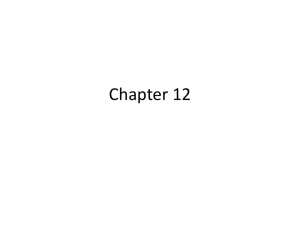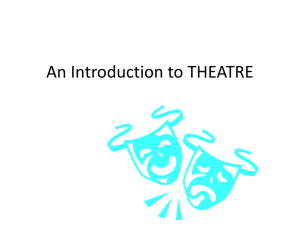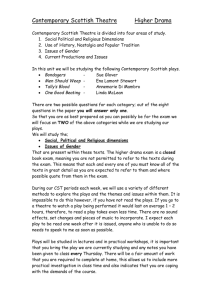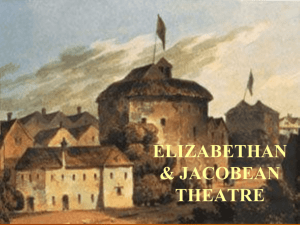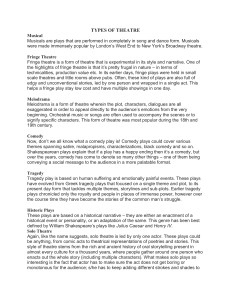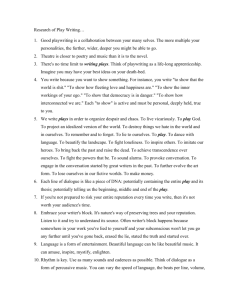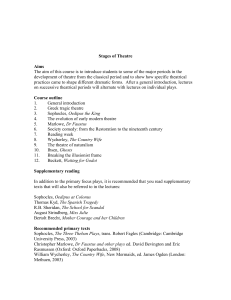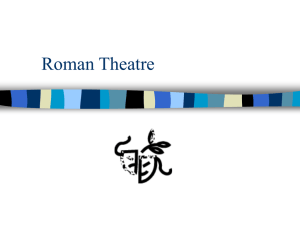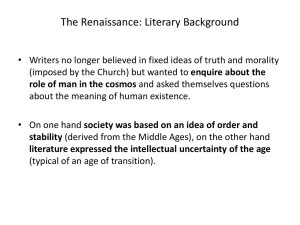What is a play? - Emporia State University
advertisement
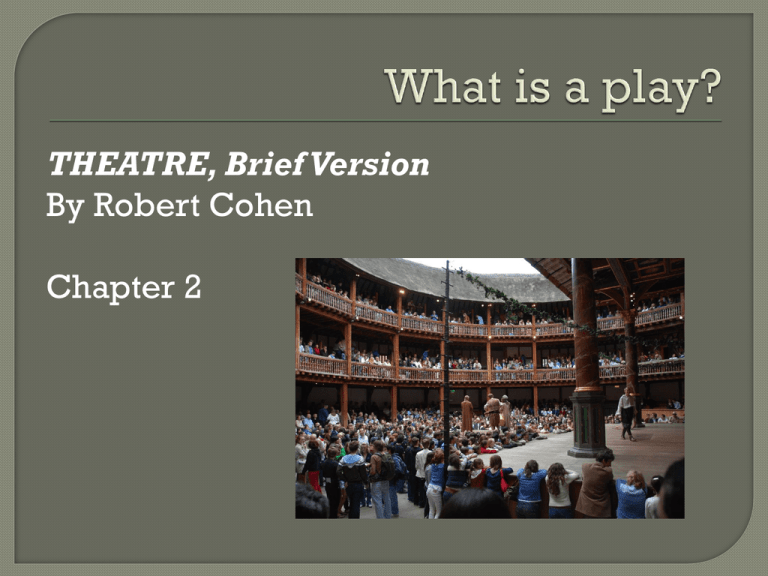
THEATRE, Brief Version By Robert Cohen Chapter 2 A play is, essentially, what happens in theatre. It is not a thing but an event. The play is the theatre’s dran (something done). A play, unlike a drama, is ACTION, not words in a book. Plays have a beginning, a middle and an end and can be classified... By duration OR By type According to Arthur Miller, the length of any given play is as long as it should be. Full-length plays are between 2 and three hours Shakespeare refers to “the three hours traffic of our stage” But in our own time plays can be almost any length Beckett’s Breath can be performed in one minute Many popular one-act plays are ten-minute plays Stoppard’s Coast of Utopia ran 9 hours Green Day’s American Idiot runs 90 minutes Another word for kind Genre is also the root for our word “gender” Another word meaning genre is type Characteristics of GENRE are not absolute, but it is a useful means of classifying plays Identified by Aristotle in his POETICS The two most ancient forms of plays A tragedy is a serious play with a topic of universal human import as its theme. The central character or PROTAGONIST is a person of high-rank or stature. During the play this character goes through a decline in fortune which leads to suffering or death. Oedipus Rex and Antigone are examples of classical Greek Tragedy Hamlet and King Lear are examples of Shakespeare tragedies Arthur Miller’s Death of a Salesman is a modern tragedy Aristotle wrote that comedy evolved from improvised entertainments and bawdy sketches Moliere George Alan Neil Bernard Shaw Ayckbourn Simon Anti-play Grim comedy Tragic farce Grand guignol Satire Vaudeville Interludes (secular comedies) Mystery plays (Bible stories) Morality plays (allegories) Some say that Shakespeare invented another GENRE expemplified by such works as HENRY V Another classical form, tragicomedy is a form that bridges tragedy and comedy. Some call it a tragedy that ends happily. Examples include the Amphytrion of Plautus (Roman) or even Shakespeare’s The Tempest and All’s Well That Ends Well A comic or disturbing play that ends darkly or ironically, like many Coen Brother films... Outwardly serious but embellished with spectacle, flamboyant dialogue, suspence and contrivance Originally accompanied by music Clear delineation between good and evil and a clear resolution are shared attributes... A pure creation of the theatre where we expect the find wildly hilarious treatment of a trivial theme— mistaken identity, illicit infatuation, monetary scheming—using stock characters, stock situations, repitition, quick changes, etc. Musicals will be discussed at length later The DOCUMENTARY is exemplified by Moises Kauffman’s THE LARAMIE PROJECT THE CONSTRUCTION OF DRAMA AND DRAMATIC PERFORMANCE In a Play, action is patterned as it is crafted in well-understood compositional patterns. We call these patterns dramaturgy. Plot is the structure of actions Characters are the agents of the plot Theme is its meaning Diction is its use of language Music Spectacle Use of asides and soliloquys Passage action of time in light or Actors “freeze” to specific behavior Each denote era develops its own conventions Preplay refers to the procession of the ancient Greek theatre and the gathering of the audience in the modern theatre The background information the audience must have in order to understand what is going on in the action of the play... Conflict and confrontation are the mechanism by which a situation becomes dramatic. Conflict is set up between characters, within them or outside of them as in melodrama. All are punished... ...the final action or speech or even a single word or gesture indicates that the passions aroused by the entire play are now stilled... Company bow or curtain call What saw? did we think about what we just Old comedy Epic theatre Theatre of cruelty Happenings Clowning Postmodernism Anti-play Circus Comedy Focus on Theatricalism ...Not plot It was not invented by Aristotle, he was simply the first to describe it Aristotelian and non-Aristotelian theatre can be valid, surprising, entertaining and more…
